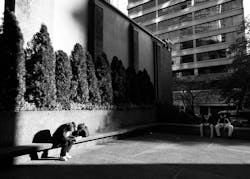"Who gets to live in the new urban America," asks the subtitle of a new book, "Generation Priced Out," by San Francisco-based housing activist Randy Shaw.
The lack of affordability in housing is at crisis-level in markets across the U.S., and progressive cities are no exception, attributed to growing wealth segregation, a lack of upzoning constricting density, less new construction, a lack of tenant protections in most markets, and the greed of real estate developers and speculators. Shaw argues that a main obstacle to greater affordability is the established power and privilege of an older generation of homeowning Americans restricting housing supply.
Shaw tells Curbed that the nature of the housing crisis has shifted over the last few years as it has grown to affect the middle class, as well as low-income and younger households. “If you’d spoken to me in 2011 and asked how Seattle is doing, I may have said it seems pretty affordable. Now, cities like Seattle, Portland, Minneapolis, and Austin all face similar problems as San Francisco." In the book's introduction, Shaw writes, “No progressive city posts “Priced Out: Only the Affluent Allowed” signs in it neighborhoods. But that’s what’s happened.”
The fealty to policies that have restricted supply and raise prices challenge the self-image of many deep blue, Democratic cities; how can you be progressive and welcoming to all if low income, people of color, students, and the middle class can’t afford a place to live? “So many cities are seeing long-standing pro-ownership policies come face to face with growth,” he says. “It’s challenging their progressive cred. If you drive a Prius and recycle, yet don’t allow apartments to be built, and then force people to drive 50 miles each way to work and cause all that pollution, you can’t say ‘out of sight, out of mind.’”
